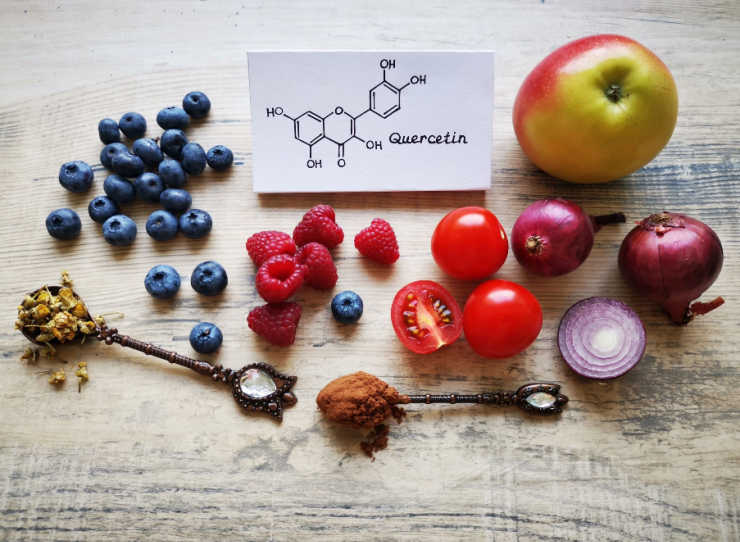
At Mercola.com, Dr. Joseph Mercola examines the many benefits of quercetin. He writes:
Quercetin is one of more than 4,000 known flavonoids,1 compounds that contribute to the bitterness, astringency, flavor, aroma and oxidative stability of many fruits, berries and vegetables.
Quercetin, in particular, is a plant pigment and natural antiviral agent2 found in foods such as onions, apples, plums and green tea, which also combats inflammation and works as a natural antihistamine.
I recommend keeping quercetin in your medicine chest for times when you feel you’re coming down with something, such as a cold or influenza. However, there’s also good reason to include plenty of quercetin-rich foods in your diet on a regular basis, as it offers multiple benefits to your health.
Quercetin Supports Heart Health
Quercetin exerts a range of biological activities that have a positive role in heart disease, including:3
Anti-inflammatory Antihypertensive Vasodilator effects Antiobesity Antihypercholesterolemic Antiatherosclerotic In one study of 30 men with coronary heart disease, consuming quercetin-rich red grape polyphenol extract led to an increase in flow-mediated dilation of arteries, which can signal improved endothelial health.4 It also inhibits platelet aggregation and has vasorelaxant properties that help lower blood pressure and prevent cardiac hypertrophy, in which the heart muscles thickens.
Another benefit to quercetin is its potential to lower uric acid levels,5 elevated levels of which are linked to an increased risk of heart disease and stroke,6 not to mention gout insulin resistance and Type 2 diabetes. Dr. David Perlmutter told Yahoo:7
“While we’ve known for decades about how uric acid increases the risk of gout, this new understanding about the role it plays in stroke is really encouraging, since there’s so much we can do to bring our uric acid levels under control. In fact, there’s great research showing how the nutrient quercetin can substantially lower uric acid levels.”
Perlmutter suggests supplementing with 500 milligrams (mg) of quercetin along with 100 mg of luteolin for a gout-lowering effect similar to that induced by the gout drug Allopurinol.8
This natural compound is also useful for optimizing cholesterol levels, as it may help inhibit oxidation of low-density lipoprotein (LDL). It also has blood pressure-lowering effects. A study on rats found daily supplementation reduced systolic blood pressure by 18% and diastolic by 23%.9
In addition, a six-week trial on overweight humans at high risk of heart disease also found that quercetin — at a dose of 150 mg per day — reduced systolic blood pressure and oxidized LDL levels.10 It may even support a healthy weight via multiple antiobesity effects. According to Pharmacognosy Review:
“Quercetin has a specific feature which inhibits fat accumulation in maturing human fat cells and simultaneously triggers apoptosis (programmed destruction) in existing fat cells. In addition, quercetin also blocks the uptake of glucose from the blood, blocks the fat cell production, and enhances fat cell necrosis.”
Quercetin Offers Allergy Relief
In the video above, chiropractor Dr. Jin Sung highlights quercetin’s role in seasonal allergies, noting that it demonstrates the greatest anti-allergy activity among flavonoids and works by modulating the release of histamine from basophils and mast cells.11
In a study comparing quercetin with herbal water on histamine release from mast cells, quercetin inhibited cells’ release of histamine by 95% to 97%.12 Other research shows quercetin supplementation may reduce allergy symptoms such as sneezing, runny nose and itchy eyes.13 The half-life of quercetin is 3.5 to 7.5 hours, so for best results you may want to take it in divided doses.
Sung recommends a dose of 500 mg to 1,000 mg two to four times a day during allergy season to help manage the symptoms, starting with the lowest dose — 500 mg, twice a day — and gradually increasing if necessary.14
Synergistic supplements for allergy relief, which you can take along with quercetin, include stinging nettle, butterbur extract, mangosteen extract, ginger, vitamin C and vitamin D.15
Read more here.
If you’re willing to fight for Main Street America, click here to sign up for my free weekly email.




